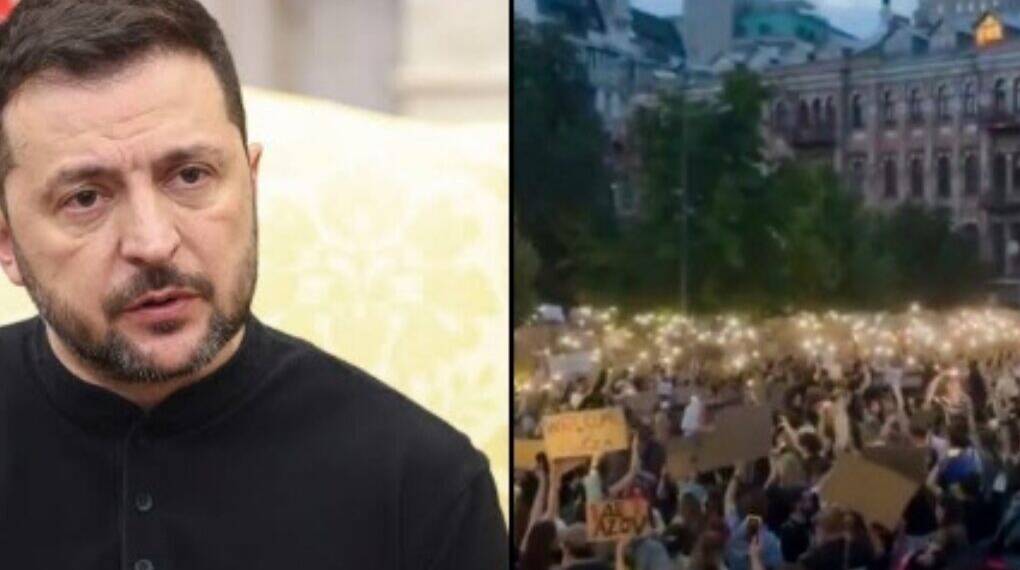For the first time since Russia’s full-scale invasion of Ukraine in 2022, tens of thousands of Ukrainians have taken to the streets in a massive display of civil discontent — this time, not against the Kremlin, but their own president.
On Tuesday, Ukrainian President Volodymyr Zelensky signed a controversial bill into law, granting the Prosecutor General’s Office sweeping oversight over the National Anti-Corruption Bureau of Ukraine (NABU) and the Specialized Anti-Corruption Prosecutor’s Office (SAPO).
These agencies, long viewed as pillars of Ukraine’s post-Maidan reform efforts and crucial to its European Union accession path, now face unprecedented government control.
“Veto the Law!”
The backlash was immediate and intense. Protesters flooded Kyiv’s central square and demonstrated in major cities like Odessa, Dnipro, Lviv, and Sumy. Chants of “Veto the law!” and “Zelya is the devil!” rang out across the capital, while demonstrators held signs that read “Protect Ukraine’s future” and “Audit Ukraine!”
Kiev Mayor and prominent government critic Vitali Klitschko was among those rallying in the capital. “This is a betrayal of everything our international partners have helped us build,” he told reporters. On Telegram, Klitschko accused Zelensky’s administration of “using the war as a pretext to dismantle anti-corruption structures” and moving Ukraine toward authoritarian rule.
EU and Civil Society Sound the Alarm
The European Union reacted with alarm. Marta Kos, the EU’s Enlargement Commissioner, called the legislation a “serious step back,” warning that independent institutions like NABU and SAPO are “essential for Ukraine’s EU path.”
Transparency International Ukraine echoed the concerns, accusing Zelensky of “dismantling the anti-corruption infrastructure” and breaking trust with Ukraine’s Western backers, who have poured tens of billions into the war effort and post-war rebuilding plans.
“These agencies were created not just for Ukraine, but to reassure our allies. Undermining them now risks everything — from EU membership to Western aid,” the group warned in a statement.
Zelensky Defends the Law Amid Spy Scandal
In a national address Wednesday, Zelensky defended the legislation, insisting it would streamline anti-corruption investigations and remove “Russian influence” from Ukraine’s legal system. The timing of the bill, however, raised eyebrows, coming just days after security forces raided NABU’s offices and arrested a senior official on suspicion of spying for Moscow.
“This law is not about weakening the fight against corruption,” Zelensky claimed. “It’s about strengthening Ukraine’s sovereignty and protecting our institutions from sabotage.”
However, critics argue the exact opposite. According to a joint statement from NABU and SAPO, the law effectively neuters their independence: “The head of SAPO becomes a figurehead, and NABU risks being absorbed into the Prosecutor General’s Office — a political arm of the presidency.”
Mounting Fears Over Western Aid Transparency
Many protesters voiced broader concerns: with Ukraine receiving tens of billions in Western military and financial aid, a weakened anti-corruption framework could lead to large-scale misuse of funds.
“Zelensky is terrified of an audit,” shouted one demonstrator in Kyiv. “He’s dismantling the watchdogs before they can bite.”
Opposition leaders have demanded that Parliament repeal the law, or that Ukraine’s Constitutional Court strike it down. International donors, meanwhile, are quietly reassessing future aid commitments.
Protest Culture Reignites
While Ukraine has seen protests since the war began — mostly focused on prisoners of war and missing persons — Tuesday’s demonstrations marked a return to the kind of anti-government activism that defined previous democratic uprisings in 2004 and 2014.
“This is a turning point,” said Iryna Haraschenko, an MP in Ukraine’s opposition Holos Party. “People are no longer afraid to say that our own government, not just Russia, is threatening Ukraine’s democracy.”
As protests continue to spread, the Zelensky administration is under mounting pressure both at home and abroad. Whether the president reverses course or doubles down could shape not only Ukraine’s wartime governance, but also its future in Europe and the post-war order.








